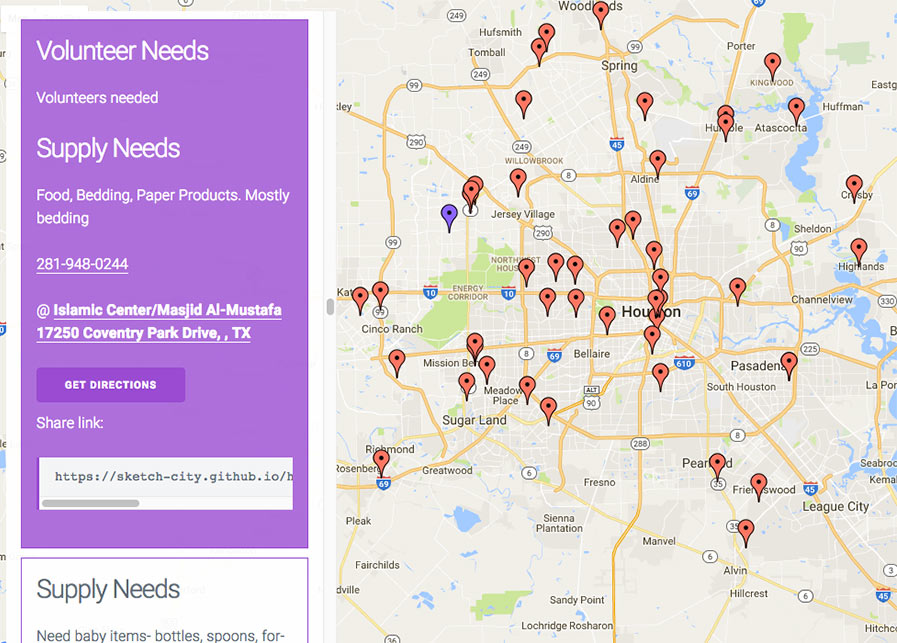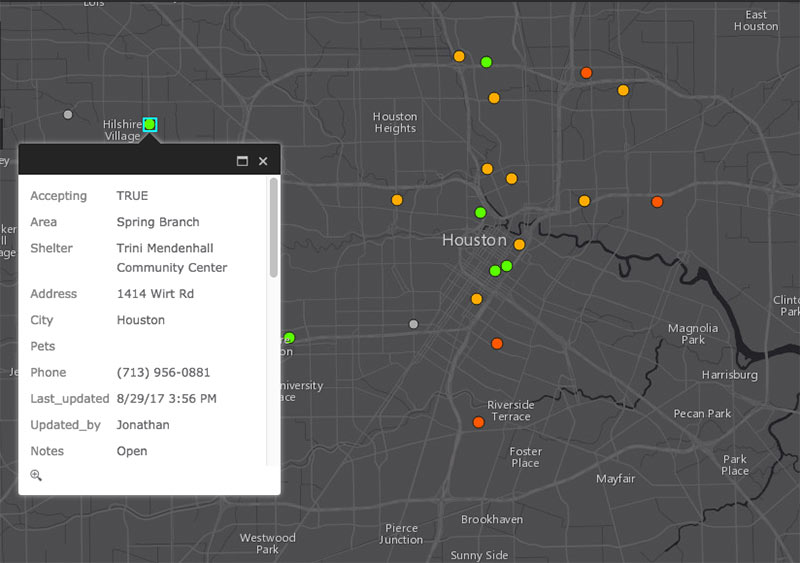A few tidbits on the Houston-Sugar Land-Baytown area from data released yesterday by the American Community Survey. The ACS is an annual survey conducted by the U.S. Census Bureau that’s separate from — and much more detailed than — the 2010 Census. (It replaces what used to be the Census’s “long form”.)
- Total area population: 5,865,086
- Percentage of population Between 5 and 17 years old: 20.1 (that’s the largest segment)
- Percentage of households that are “nonfamily households” (includes same-sex-couple households with no relatives of the householder present): 28.9
- Average number of people per household: 2.89
- Percentage of people over 15 years of age who are currently married (and not separated): 50.1
- Percentage of population over 25 years of age with a bachelor’s, graduate, or professional degree: 27.9
- Percentage of adult population who are civilian veterans: 7.4
- Percentage of noninstitutionalized population with a disability: 9.0
- Percentage of persons who lived in the same place this year as last: 82.7
- Percentage of population born outside the U.S.: 21.8
- Percentage of workers who drive alone to work: 78.8
Who carpool: 12.1
Who take public transportation: 2.2
Who walk: 1.5
There’s more!
***
- Mean travel time to work: 27.6 minutes
- Percentage of employed people who work in the construction industry: 10.2
in retail: 10.5
in professional, scientific, management, administrative, or waste management services: 12.2
in arts, entertainment, recreation, accommodation, or food services: 7.9 - Median household income: $54,146 (down from $56,250 in 2008)
- Percentage of persons below the poverty level (as calculated by the U.S. Office of Management and Budget): 15.3
- Percentage of noninstitutionalized persons covered by private health insurance: 59.3
With no health insurance: 24.6 - Percentage of housing units occupied by renters: 37.7
- Average household size of owner-occupied unit: 3.02
- Average household size of renter-occupied unit: 2.68
- Percentage of all housing that consists of 5 or more units: 23.6
- Percentage of housing built since 2000: 22.8
- Percentage of housing built before 1940: 2.8
- Percentage of occupied housing units with electric heat: 51.2
- Percentage of homeowner households paying 30 percent or more of household income on housing: 32.4
- Percentage of renting households paying 30 percent or more of household income on gross rent: 49.5
- American FactFinder [U.S. Census Bureau]




Percentage of homeowner households paying 30 percent or more of household income on housing: 32.4
Percentage of renting households paying 30 percent or more of household income on gross rent: 49.5
****
I’m surprised that the first quoted percentage is so low, and that the second quoted percentage is so high.
Interesting…..
I’m surprised by the percent of people 25 years or older with at least a four-year college degree.
I also–simply outright–do not believe that median household income has dropped so little.
The number of poeple on disability is 9%? Wonder what the real number would be if our welfare and medicare system weren’t abused.
One of the reasons that median household income may have dropped less than you expected is the fact that when faced with economic hardship, many folks are forced to double-up.
When a kid moves back in with mom and dad, a household is lost, but mom and dad’s household income stays the same.
When times are tough, two friends may become room mates. That’s one less household, but the new household has higher income.
Extrovert, that’s people with a disability, not workers ON disability. Your soapbox is showing.
Is the population total based on the new census data? I am still giddily waiting to see how close we will be to Chicago once the 2010 Census results are published.
Superdave, did you read the post?
It’s is NOT based on 2010 census. It’s from the ACS which is performed more often, yet is not as detailed as the census.
Ouch…kjb434…don’t be hatin’…
The number 5,865,086 jumped right out and stole my attention away from the intro. I had no idea the metro area is that big now. I just want to see how we will end up ranking against Chicago when the data is “official” and published.
All that fussin about how we need rail lines for the 129,031.89 people who ride public transportation. Doesn’t seem like a sound investment to me.
That’s what rail critics have been saying for years. Of course most rail supporters think that if it’s built it’ll magically get all kinds of new riders.
Gee, if we hadn’t built 20 lane highways 40 miles into the suburbs, how many magical drivers would their be? We’ve built ridiculous highways,’grand’ parkways, and tollways across farmland and ranches for decades and the drivers just keep coming. If we had built a comprehensive rail system across the 100 sq. miles inside and around the Loop for the last 40 years instead, the public transport vs. single driver numbers would be completely different.
.
Now, since we have promoted and enabled a city that is more than 600 sq. miles in size, we are stuck trying to provide city service across all of those miles for fewer than 4 million people. Hardly efficient. Truly dumb. A waste of $millions every year.
.
This is what you get when you allow government to be run by real estate developers and speculators. Anyone who believes that having nearly 80% of the working population driving alone to work is sustainable over the long-term is delusional. We got a taste when gas hit $4 a couple years ago.
.
Houstonians will regret the highways or no way transportation system one day, likely sooner than most want to believe.
Tell it brother John!
John,
There are many cities around the world that have about the same urbanized area as the Houston metro, yet they have populations that catapult way beyond our measly 5.8mil. London and Paris are good examples. London metro has a population hitting between 12-14mil. Paris metro hits just above 11mil. In the U.S., that would be the metros of NYC and Los Angeles. Houston is a just a small metro in population. Building rail now cannot be justified. Even if must of the “wasted” money on roads were spent towards rail, traffic and road congestion would demands would eventually require freeways and the suburbs would be just as far out (if not further in NYC’s case).
Historically, rail created the first far out suburbs, not freeways.
“Building rail now cannot be justified.” Umm, whatever. None of the cities you reference are without rail. None. I’ve been to all of them and don’t recall seeing six (or a single) highway running through them. Paris has a couple running under it, but that’s because they understand the value in not destroying the city center’s quality of life with a 20 lane highway running through it.
Houston highways are doubled in size every 25 years or so, it seems. If not rail, how do you propose we deal with projected population growth in the next 25 − 50 years? A 100 lane Katy Freeway? Bus Rapid Transit?
Nothing moves as many people as rail. There is a reason why every major city has it. Houstonians can keep believing the hype that Houston is sooo special and sooo different that we can rely on highways alone, forever, to our detriment.
.
The highway engineers and developers will just keep laughing all the way to the bank; and using the billions they make off taxpayers to escape to Paris, London, and New York when they want to experience great cities – while we sit in traffic.
John, Houston’s administrative boundaries do not reflect on the spatial distribution of people within the metropolitan area. For instance, Dallas is a much smaller city than we are, but their metro area is larger and more populous.
Also, with respect to your fantastical comments regarding what could’ve been, I profer unto you an analogy: if my grandmother had had a penis, she’d be my grandfather.
So, your grandmother could be transgender, and she/he could have married your grandfather and had kids through surrogacy or adoption; you’d still be here.
.
What does Dallas have to do with anything, except for the fact that they have already built many more miles of rail are building more to be better prepared for the future than Houston?
John,
My post was to show that those two cities with rail have doubled the population and it’s on about the same amount of land as the Houston metro. On top of that, they never benefited from a central freeway network early on from their age.
If you you knew about traffic engineering and transportation design, you would realized there is a logical limit for freeway expansion. The Katy Freeway knocks on that door as a maximum limit. Anything beyond the 8-10 lane will not improve traffic because cars still have to switch lanes to exit. Houston’s freeways (except for US 290 and sections of I-45) are pretty much at their maximum limit. TxDOT plan for future projects only focus on widening those two freeways. I-45 mostly will be widening due to safety issues and interchange improvements. Beyond that, the only other major changes to the Houston freeway system planned is reconstruction existing outdated interchanges (I-45 at 610 on both ends for example).
Houston is entering the phase in transportation terms where rail is barely beginning to be thought of as a necessity. Even then, the need for thinking about designing and deciding which lines to built for a commuter rail type system is still a good 10-15 years away. Construction of additional HOT lane configuration prove more viable and can move a lot more people than commuter rail. METRO’s park-n-ride service blows away commuter rail numbers for metros of comparable size. We essentially already have commuter rail.
Light rail is a different animal that is only truly needed based upon density and can’t be brought into any argument with freeways. Doing so would show the complete lack of understanding by the one who brings it up of transportation and the movement of people. Light rail will have a place in Houston and there will be a need for it. I have lots of problems with METRO’s plans for light rail, but overall it is something that we could use long before commuter rail.
Dallas is a great example of what NOT to do. They utilized light rail for commuter rail purposes and built many lines that provide slower service than sitting in traffic. Add that the transit agency is serious financial trouble and no one rides those trains, I guess Dallas transit is doing good! HAHAHA
“Building rail now cannot be justified.”
So when will it be?
Arrogant much?
.
Seems that simply put; there are some who believe it’s better to plan, design, and begin building a rail system sooner when land and all other costs are lower; and others who think you should wait until you have no choice and costs will be exponentially greater.
.
Dallas and Los Angeles will need rail systems as much as Houston will in the future; the difference is that they are smart enough to be making the investment now. Houston will once again be playing catchup.
.
(HAHAHA)? Really? Grow up.
John,
Houston is moving tons of people each day by HOV Lane buses into the CBD.
Tens of thousands of cars are off the road every single day because of this.
I know trains are sexy but these buses are workhorses.
John, the “you’d better build it now before prices go up!” gambit only makes sense if construction costs rise at a long-term rate that exceeds the growth of the tax base (or essentially, at a rate that is faster than inflation). It’s a dubious claim.
Craig,
You have to realize that John doesn’t care if buses are doing a better job or if Houston really needs trains. He just thinks that a train makes the city “world class” and wouldn’t be embarrassed when his friends visit.
Niche, and the costs of real estate and business buyouts ala Katy Freeway are stagnant?
kjb434, You don’t know me or what I care about. Your online arrogance is stupefying. You are the one who brought up London, NY, LA, and Paris AND you are the one who declared that rail WILL BE needed here eventually. Why do you have to be a total ASS because I don’t agree with you about when that is? Get over yourself, you’re a bore.
LOL!
Yes, we may eventually need rail, but wasting money on it now makes no sense and many metros across the U.S. are finding out. The next big financial implosion is municipal bond debt. Transit agencies fall into that category. Surprising that there are many other ones out there than make metro look like a saint.
Yep, let’s waste billions finishing the GRAND Parkway – making the current problems worse, but further enriching more billionaire landowners in the process. The Houston-Harris County way. Brilliant.
Wow, you’re at once ignoring the impact to construction costs of the biggest economic run-up and blow-out since the Great Depression and have resorted to calling an opponent an arrogant, stupefying bore, and an asshole…as though ad hominems make your point. I’d assert that your ad hominems make our point, seeing as how you’ve evidently got nothing better to put forward.
Grand Parkway – a facility that will actually be utilized to justify the small taxpayer cost. Why? Because HCTRA will be tolling it’s portion. Montgomery County and Brazoria County are working with TxDOT for it’s portion just like Chamber’s County has already done. If it’s tolled, the money isn’t being wasted.
The developer argument is the most laughable because the same argument can be turned around on any rail plan with the SAME developers. Commuter rail was being pushed for the Galveston to Houston then up the 290 corridor as a development vehicle. Rail in earlier times in NYC, Boston, and Chicago were built as schemes with developers. Modes may change, but motives stay the same.
Where’s Christof Spieler on this one??
METRO isn’t letting him talk to the public. They have him in a cage until they need him.
What, exactly, are the advantages of a rail over a bus? The rail is just an expensive bus on tracks that cannot adjust its route if needed. It just does not make sense to spend ridiculous amounts of money on the rail…let’s put the money towards buses that run on natural gas. Or, hey, that kind of money could go towards developing a hybrid or electric bus, ya think?
David,
GM makes a deisel/electric hybrid bus used in several cities. Vancouver, BC is one city that I know that has completely transitioned it’s bus fleet. Seattle was in the process.
Add to you comment that METRO could utilized smaller shuttle buses similar to what is used by the Washington WAVE for certain routes.
Have any of you lived in a city where you HAVE to ride a train or subway? IT SUCKS!!! You have to schlep several blocks to the station then change trains or get on a bus or trolley to get to generally where you want to go then schlep some more blocks to your final destination. Imagine doing it here in the summer! Even is super congested cities people will always pick a car if they can. There’s a reason developing countries skipped land line phone and went straight to cell phones, it’s more convenient and there’s really no reason to resurrect 100 year old technology.
kjb and TheNiche:
Bob Lanier says: “Thanks again, minions”.
Niche: “Your ad hominums make our point”.
I’m afraid that does not necessarily follow.
Niche: Your protection of your ally is nifty, but your ally leads with “…if you knew about traffic engineering and trans. design”…which could strike an objective observer as…ummm, condescending, maybe arrogant, considering he doesn’t know his opponent.
Where’s the fairness?
John, I couldn’t agree more. Also, regretting lost opportunities is not counterproductive or “fantastical” (Niche)
because we all know that those who don’t learn from the past are doomed to repeat it. Absent Lanier, we could have been using a rail system IN CONJUNCTION with our astonishing bus sytem (?) and assidiously retiring the debt.
kjb – Your spurious argument regarding the same developers benefitting the same amount in re your road vs. rail collapses utterly when one considers that Lanier et al, make their serious $ on raw farmland
converted to far-flung., middle of nowhere
housing dependent on services, incl. roads
being dragged out to THEM. In the rail analogy RE-development, occurs along and ADJACENT to dedicated rail corridors.
The raw-land speculators (e.g., Mayor Bob)
DO NOT benefit. Instead, the beneficiaries are much more piecemeal.
It’s startling to see worker bees ardently running cover for billionaires,
but kjb-rail building encyclopedia (not an insult) may have a dog or two in that hunt.
This a discussion where the devastating impacts lie 10-20 years down the ROAD.
As noted, 20% of our population is children, who will soon enough have children, who….etc. Gridlock.
But kick the can down the ROAD, rail-haters…and Mayor Bob will have his wife send you some roses.
Fight on, John.
Udunno, your comments (and name) speak for themsevles.
You can’t knock the man for being right on good ol’ Bob Lanier though.
Niche-
Yes, they do and Udunno.